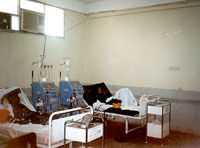
Hodeidah Kidney Dialysis Centre, Poor Abilities & Negligence [Archives:2000/43/Health]
October 23 2000

Farouq Al-Kamali
Yemen Times
Hodeidah
Of the most Yemeni cities afflicted with diseases, Hodeidah occupies top of the list. The number of people afflicted with Malaria and bilharzia exceeds tens of thousands every year. Renal dialysis amounts to 25% of total cases here out of which 70% exists in remote areas such as Wadi More; an area which suffers lack of health services. Many patients pin hope on the only Dialysis Center which provides consultations, free of charge drugs and supervises bloody ascites.
The center is located on the second floor of the Health Cooperation Center. Occupying a small place, tens of patients sleep in front of its gate awaiting death. The only two doctors here respond to patients complaints about insufficiency of services by explaining the condition of the center, which owing to lack of equipment can not do more than what it is doing.
The dirty waiting room made us meet and ask director of the center who said that there was no budget for cleanliness and nutrition. The image might suggest miseries, but none can deny the great help it offers to patients of renal dialysis, he said. He added that it was lack of facilities that prevent better services.
Despite the increasing number of patients, the center has been closed down for more than once. The center was established in 1993 with efforts of the Local Council in cooperation with Renal Dialysis Patients Friends Society, the Yemeni-Austrian Society and the Ministry of Health, though with a modest share, explained the director Dr. Maher Ismael. The annual YR6 million budget is not enough to cover services for three months. We depend on donations of traders for the rest of the year, especially after the decline of the health Cooperative Centers Revenues. As for substances used in dialysis, 80% are provided by traders and the Health Ministry provides only 20%. So, it was lack of financial support to maintain equipment and purchase of needed appliances, and that caused the centers closure, he added.
During the closure of the center, patients had to travel either to Taiz or Sanaa for treatment. Eight patients from Hodeidah died last year in Sanaa for not receiving enough time for dialysis.
After 6 years of interrupted services, the center was adopted by the Health Ministry. The beginning was promising when it received 11 medical equipment. However, they dont work. Dr. Maher said that the center had received some equipment from the Ministry of Health but there were no technicians to operate. He deplored the tall promises from the Ministry to include the center within its responsibility which so far had been mere promises. Lack of maintained devices, he said, pushed us sometimes to decrease period of bloody ascites from 4 to 2 hours in order to serve all patients. Others can not get such operations, he added.
The deplorable condition of the above mentioned center needs immediate attention from authorities concerned. A qualified cadre should be made available to work on devices. There should also be an inpatient wards to receive patients.
——
[archive-e:43-v:2000-y:2000-d:2000-10-23-p:./2000/iss43/health.htm]


